6 foods and drinks to avoid if you get heartburn
Limiting these items may help to ease symptoms.
Updated on December 3, 2024
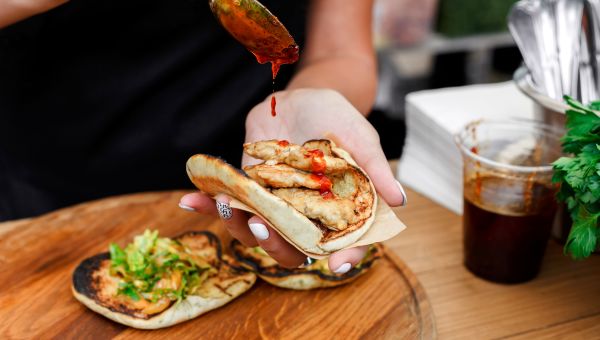
If you experience acid reflux, a condition characterized by a burning pain in your chest, you're not alone. According to the National Institutes of Health (NIH), more than 60 million Americans have heartburn at least one time each month. The good news is that acid reflux and its most recognizable symptom, heartburn, are treatable, and even preventable.
What causes heartburn? It has to do with your esophageal sphincter. It’s a ring-shaped muscle that opens to allow food into the stomach, then closes to prevent food and digestive juices from flowing back up into the esophagus (food pipe). When the sphincter is weak, it allows those stomach contents to bubble into the esophagus, causing the sensation we know as heartburn.
Obesity, pregnancy, hiatal hernia (when the upper portion of the stomach pokes up through the diaphragm and into the chest), smoking, and certain medications (like painkillers and drugs used to lower blood pressure) can cause acid reflux. Certain foods and drinks can trigger discomfort, too, such as the following.
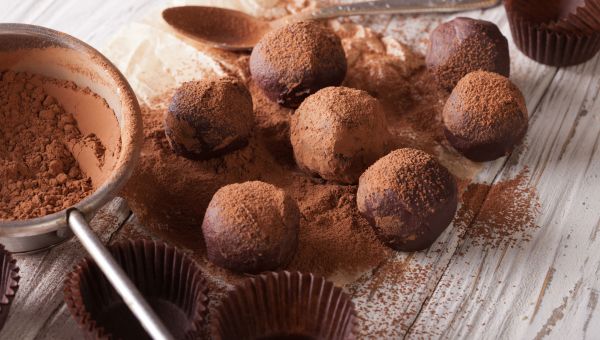
Chocolate
For some people, chocolate can worsen reflux symptoms, like heartburn. "Certain foods relax the sphincter, the opening between the esophagus and stomach," says Vivek Mittal, MD, a gastroenterologist in Fresno, California.
There are likely a number of reasons why chocolate may have this effect. The caffeine content can exacerbate symptoms. Chocolate contains more caffeine than you might think, at 12 milligrams per ounce. The darker the chocolate, the more caffeine—70 percent dark chocolate contains about 25 to 30 milligrams per ounce.
Chocolate also tends to be high in fat, and fatty foods are a known trigger. Instead of reaching for chocolate, consider satisfying a sweet craving with a piece of fruit, like a banana or apple, which won't likely leave you uncomfortable.
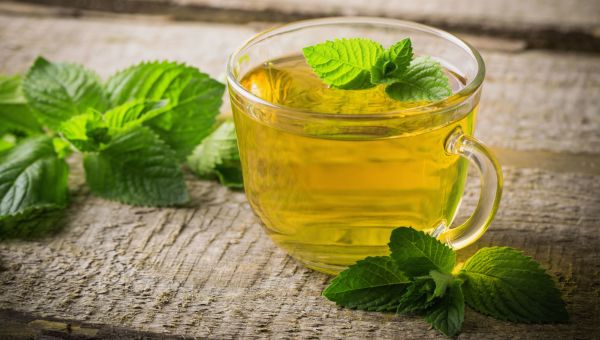
Peppermint
Peppermint, often used to flavor gum, tea, and toothpaste, can soothe an upset stomach, but it might not be the best remedy for other gastrointestinal (GI) issues.
Sipping a warm glass of peppermint tea as a way to unwind after a long day actually relaxes us from the inside, out. Peppermint can loosen your stomach muscles, making it effective in soothing indigestion. But the same process can actually worsen acid reflux. In addition to the stomach, peppermint relaxes muscles in the esophageal sphincter. This increases the likelihood of reflux.
A 2019 review published in the Journal of Thoracic Disease found that mint is one of the most commonly reported triggers for patients with gastroesophageal reflux disease (GERD). GERD is characterized by having heartburn two or more times a week. If your minty nightcap could be the cause of your discomfort, try sipping a glass of water instead.
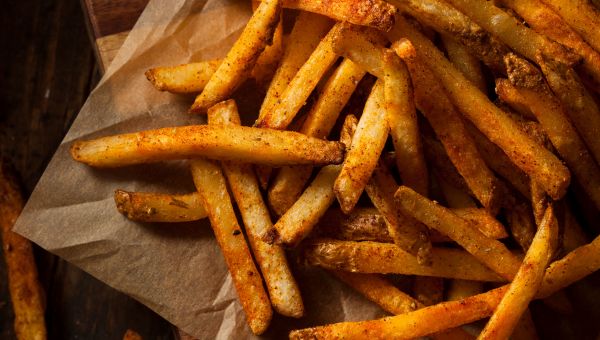
High-fat foods
We know fatty foods like french fries and red meat can contribute to a number of health issues. They may also worsen heartburn for some people.
High-fat foods take longer to digest than some other eats, so they sit longer in your stomach. This extended process raises the risk of reflux. Fatty foods also tend to be high in calories, too, many of which can increase your risk for becoming overweight or obese. Extra weight is a leading risk factor for acid reflux. "If [extra weight] pushes on the stomach, it pushes the acid up," Dr. Mittal says. "It's almost like squeezing the stomach and sending that acid up into the esophagus."
If you experience discomfort after eating a high-fat meal, consider trying to reduce your fat intake with these tips.
- Reach for low-fat dairy products, like cheese, yogurt, and milk.
- Choose lean cuts of meat, like skinless chicken or turkey breast.
- Avoid fried foods.
Some simple tips can help you avoid reflux outside of the kitchen, too. Heartburn typically worsens when lying down, so try raising the head of your bed or use a foam wedge under the mattress. It’s also helpful to avoid eating for two to three hours before bedtime.
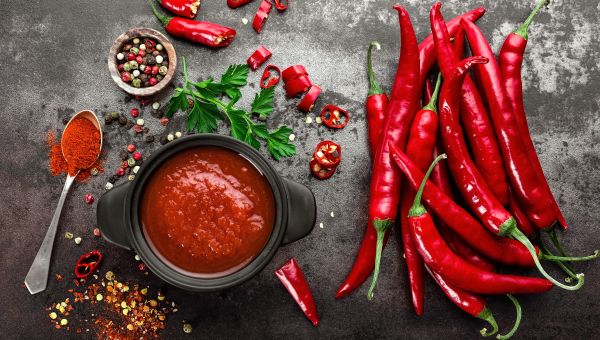
Spicy and acidic foods
Spicy foods, like horseradish, kimchi, and chili peppers aren't for everybody. Together with acidic treats like citrus fruits and tomatoes, these foods have a bad reputation when it comes to reflux.
According to the American College of Gastroenterology, so far research has not found a link between spicy foods or acidic foods and faulty sphincter function. However, they might irritate your throat or stomach, so experts may still recommend avoiding these foods in the event they cause you discomfort.
If spices don’t agree with you, try seasoning your food with milder herbs, like thyme, basil, dill, and a sprinkle of sweet or smoky paprika.

Dairy
For some, dairy products, like milk, cheese, and yogurt, can worsen acid reflux. The high fat content of many dairy products may be to blame: Whole milk yogurt contains about 7.5 grams of fat per 8 ounces. The longer digestion process involved with high-fat foods may increase your risk for acid reflux.
Although a milk allergy doesn't cause or worsen acid reflux, lactose intolerance or other dairy-related symptoms can trigger heartburn. Speak with your healthcare provider (HCP) about getting tested for an allergy or intolerance. Allergies involve the immune system, while intolerances involve the digestive system.
Your HCP can help find the best ways to reduce dairy-related heartburn, which may include avoiding dairy products altogether. Fear not, there are plant-based substitutes for milk, yogurt, and cheese.

Alcohol
Alcohol affects your entire body, and when consumed in excess, it can have some detrimental effects. Excessive drinking is defined as drinking while pregnant or under the age of 21, consuming four or five drinks on a single occasion, and sipping eight or more weekly drinks as a woman or 15 or more weekly drinks as a man. It can increase your risk for cancer, brain damage, and kidney disease.
A night of drinking, or even a single cocktail, can also cause some uncomfortable short-term consequences. Alcohol is a depressant, meaning it slows down the body's processes, and in some cases, the esophageal sphincter may be affected. A 2019 review published in Current Medicinal Chemistry found that when it came to alcohol, the first hour after drinking was the most likely period of time a person would experience heartburn.
More research is needed to link alcohol and reflux, but if you suspect your weekend cocktails could be causing you discomfort, skip the booze and try pouring a tasty mocktail.

National Institute of Diabetes and Digestive and Kidney Diseases. Definition & Facts for GER & GERD. Page last reviewed July 2020.
National Institute of Diabetes and Digestive and Kidney Diseases. Symptoms & Causes of GER & GERD. Page last reviewed July 2020.
National Cancer Institute—Dictionary of Cancer Terms. Sphincter. Page accessed March 23, 2024.
Johns Hopkins Medicine. Hiatal Hernia. Page accessed March 23, 2024.
National Institute of Diabetes and Digestive and Kidney Diseases. Eating, Diet, & Nutrition for GER & GERD. Page last reviewed July 2020.
Harvard T.H. Chan School of Public Health—The Nutrition Source. Dark Chocolate. Page last reviewed March 2023.
Johns Hopkins Medicine. GERD Diet: Foods That Help with Acid Reflux (Heartburn). Page accessed March 23, 2024.
Mayo Clinic. Acid reflux and GERD: The same thing? Page last updated July 1, 2023.
Restivo, Jenette. “GERD diet: Foods to avoid to reduce acid reflux.” Harvard Health Publishing. July 31, 2023.
U.S. National Library of Medicine MedlinePlus. Gastroesophageal reflux disease. Page last reviewed January 30, 2023.
American College of Gastroenterology. Acid Reflux / GERD (gastroesophageal reflux disease). Page accessed March 23, 2024.
Katz PO, Dunbar KB, Schnoll-Sussman FH, et al. ACG Clinical Guideline for the Diagnosis and Management of Gastroesophageal Reflux Disease. Am J Gastroenterol. 2022 Jan 1;117(1):27-56.
Mayo Clinic. Lactose Intolerance. March 5, 2022.
Centers for Disease Control and Prevention. Alcohol Use and Your Health. Page last reviewed February 29, 2024.
Surdea-Blaga T, Negrutiu DE, Palage M, Dumitrascu DL. Food and Gastroesophageal Reflux Disease. Curr Med Chem. 2019;26(19):3497-3511.
Jiang D, Zhuang Q, Jia X, et al. Current complementary and alternative therapy for gastroesophageal reflux disease. Gastroenterol Rep (Oxf). 2023 Oct 4;11:goad057.
More On


video

article


video


video


video
